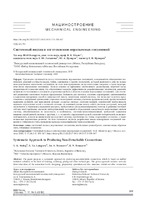| dc.description.abstract | Предложен системный подход к изготовлению неразъемных соединений, основанный на объединении технических решений в области сварки, пайки, склеивания и других технологий, который включает в себя не только непосредственное выполнение соединения, но и его конструирование, подготовительные операции, а также мероприятия после образования соединения. Подход основан на принципах необходимого разнообразия, обратной связи, иерархичности и декомпозиции, что обеспечивает высокую эффективность разрабатываемых технических решений, возможность постановки и успешного разрешения проблем в области создания неразъемных соединений. Для успешной реализации системного подхода предлагается учитывать ряд аспектов: системно-структурный, заключающийся в выяснении внутренних связей и зависимостей между элементами данной системы, что позволяет получить представление о внутренней организации (строении) исследуемой системы; системно-функциональный, предполагающий выявление функций, для выполнения которых создается система; системно-целевой, означающий необходимость научного определения целей и подцелей системы, их взаимной увязки между собой; системно-ресурсный, который заключается в тщательном выявлении ресурсов, требующихся для функционирования системы и решения системой той или иной проблемы; системно-интеграционный, состоящий в определении совокупности качественных свойств системы, обеспечивающих ее целостность и особенность; системно-коммуникационный, требующий выявления внешних связей данной системы с другими, т. е. ее связей с окружающей средой; системно-исторический, позволяющий выяснить условия возникновения исследуемой системы, пройденные ею этапы, современное состояние, а также возможные перспективы развития. На базе системного подхода разработаны новые конструкции соединений смешанного (гибридного) типа, приведены примеры и классификация таких соединений. | ru |
| local.description.annotation | The paper proposes a systematic approach to producing non-detachable connections which is based on unified technical solutions in the field of welding, soldering, gluing and other technologies. The given approach includes not only direct execution of the connection but its designing, preparatory operations and also measures carried out after connection producing. The proposed approach is also based on the principles of the required diversity, feedback, hierarchy and decomposition that ensures high efficiency of the developed technical solutions, possibility for setting-up and successful solution of problems in the field of producing non-detachable connections. In order to ensure a successful realization of systematic approach it is proposed to take into account a number of aspects, including the following: systematic and structural aspect that presupposes determination of internal relations and dependences between elements of the given system and it permits to obtain an overview about internal structure (composition) of the investigated system; systematic and functional aspect that presupposes determination of functions, and the system is created for performing these functions; systematic and purposeful aspect that signifies a necessity of scientific determination of system goals and sub-goals, their harmonization between themselves; systematic and resource aspect that presupposes thorough determination of the resources which are required for system performance and solution of various problems with the help of the system; systematic and integration aspect that presupposes to determine a complex of system qualitative properties which ensure its integrity and specificity; systematic and communication aspect that requires determination of external relations of the given system with others that is its relations with the environment; systematic and historical aspect that permits to determine conditions for creation of the investigated system, its past stages, modern state and also possible prospects of development. New connection designs of combined (hybrid) type have been developed on the basis of the systematic approach and the paper presents examples and classification of such connections. | ru |

